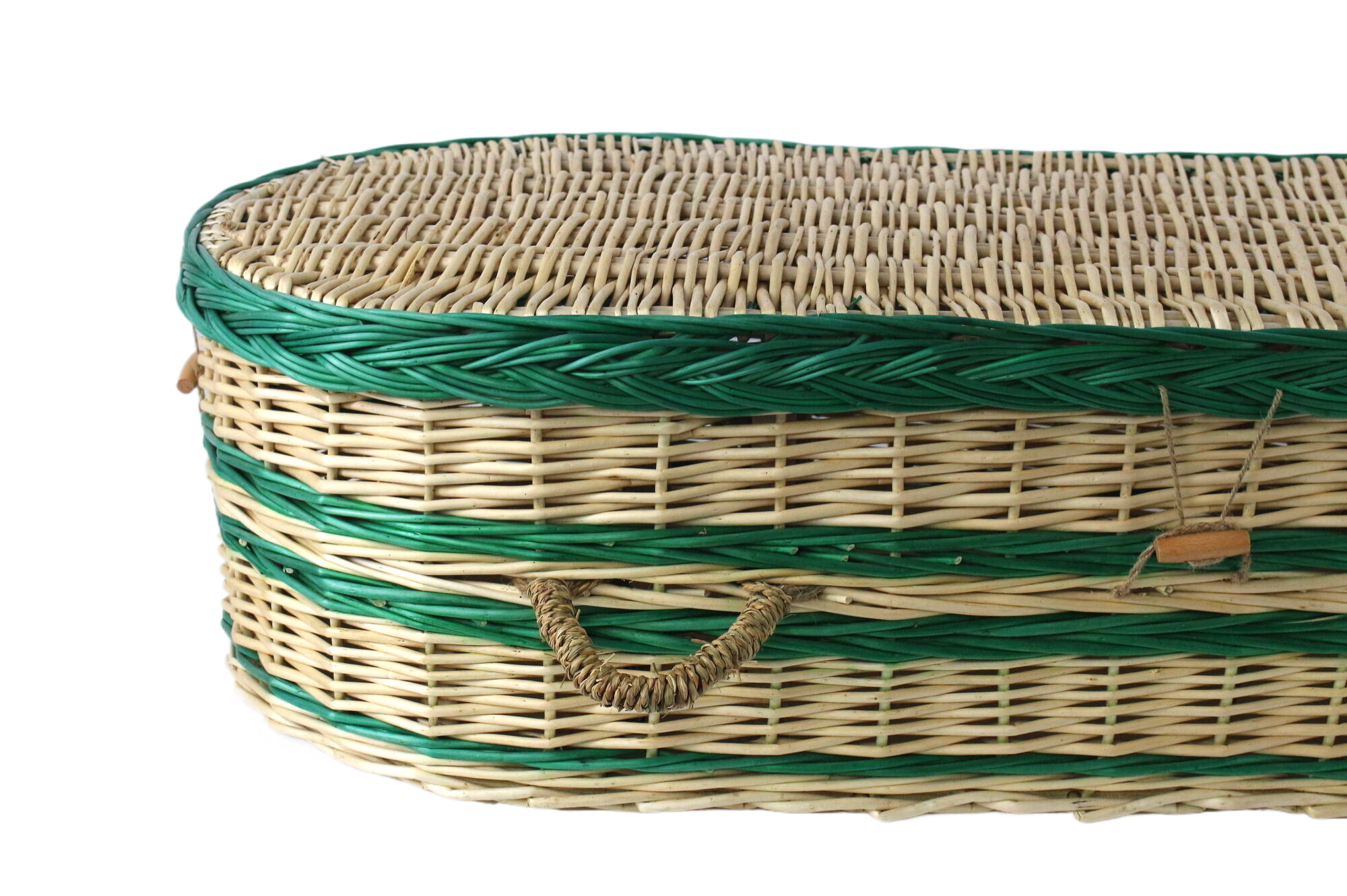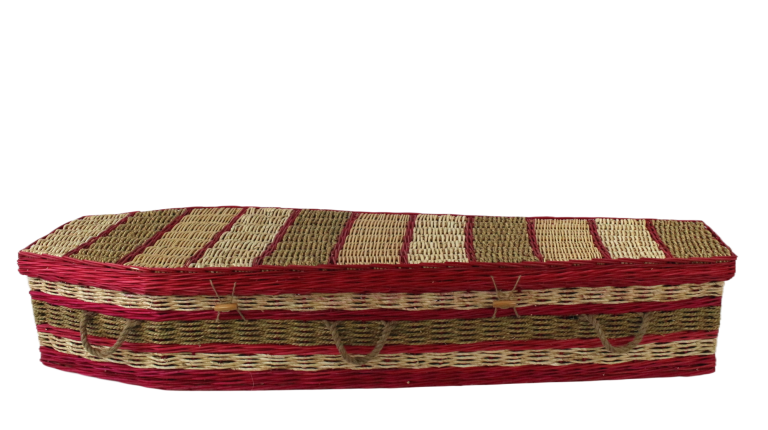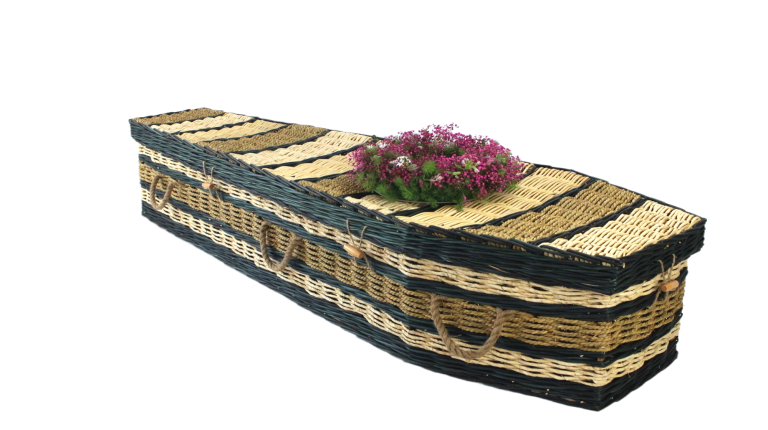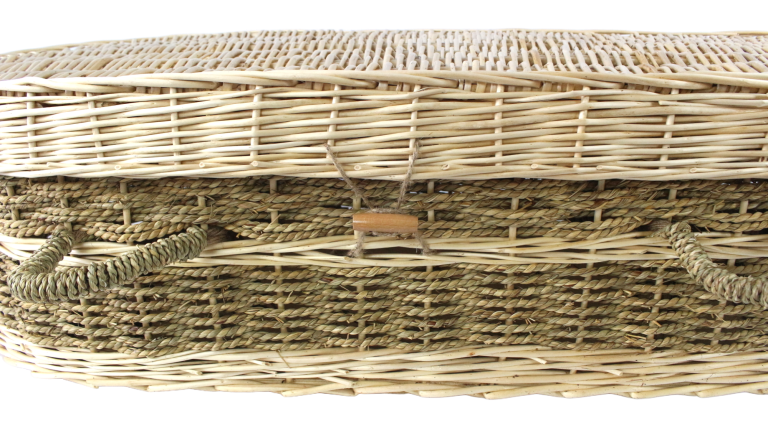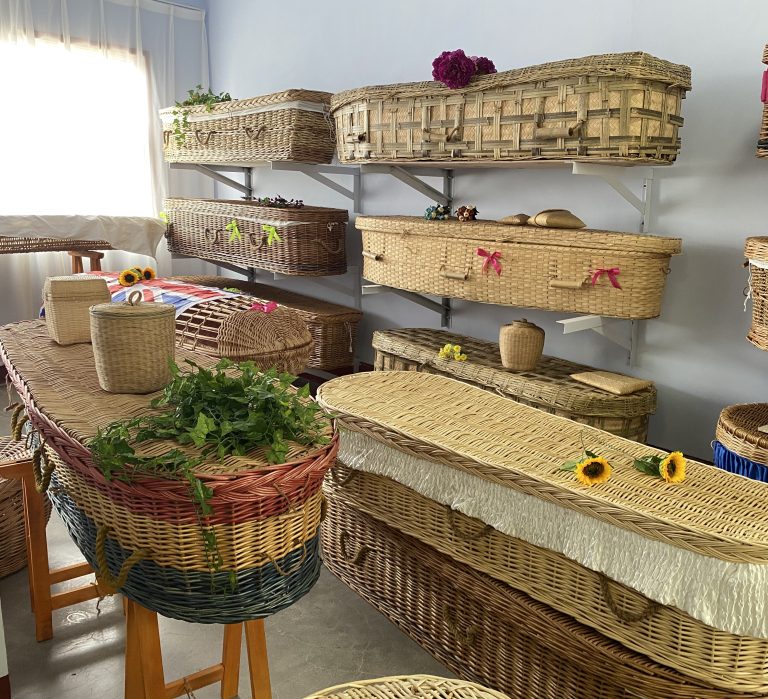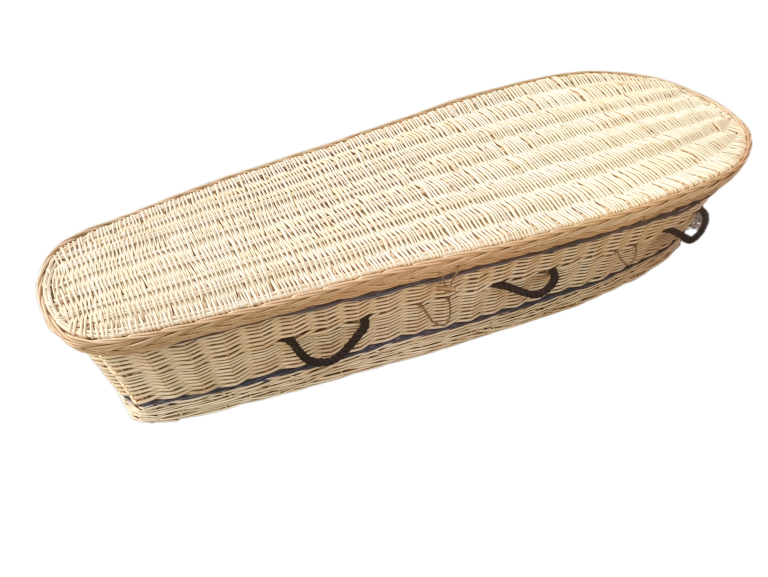In the silent revolution of funeral design, woven coffins are evolving from a traditional craft into a fusion of biotechnology and ecological philosophy. New York designer Shaina Garfield’s “Leaves” system and Dutch Loop Biotech’s “Living Cocoon” jointly reveal a subversive proposition: when fungal spores weave into the bonds of life, funerals are no longer the end of life, but the beginning of a natural cycle. This design, which dynamically couples mycelial growth with human decomposition, redefines the ecological value of death.
I. The Decomposition Engine of Spore Ropes: A Poetic Expression of Biotechnology
1. The Metabolic Wisdom of Fungal Networks
The woven ropes embedded with spores form the core of a microscopic ecosystem. When the coffin is buried in the soil, moisture triggers spore germination, and the mycelium rapidly forms a three-dimensional network, secreting decomposing enzymes such as cellulase and ligninase. These enzymes not only break down cadaver tissue but also transform toxins such as formaldehyde and heavy metals in preservatives into harmless substances. Loop Biotech’s mushroom coffins in the Netherlands, made from a composite structure of mycelium and hemp fibers, completely degrade within 45 days, over 30 times faster than traditional wooden coffins.
2. Deep Synergy of Material and Function
In Shaina Garfield’s design, the body, wrapped in natural cotton, is secured with spore-infused ropes, while a pinewood base provides initial nutrients. During decomposition, the mycelium forms a biofilm that absorbs pollutants from the soil, increasing soil fertility by 20%. This dual function of “purification and nourishment” transforms traditional cemeteries into nodes of urban ecological restoration.
II. From Concept to Practice: Breakthroughs and Implementation in Global Laboratories
1. North America: A Weaving Ritual for Emotional Healing
The “Leaves” system transforms funerals into collective ecological rituals. Mourners work together to weave ropes infused with Ganoderma lucidum spores, each knot carrying a memory of the deceased. After burial, the mycelium decomposes within 6-12 months, and memorial trees planted above the cemetery absorb nutrients through their roots, forming a “forest of life.” In a New York City pilot, this design reduced participants’ grief by 40%, as it transforms death into a visible continuation of life.
2. Europe: An Ecologically Closed Loop of Industrialized Production
Loop Biotech’s mushroom coffins are cultivated using a mixture of mycelium and agricultural waste (such as straw and sawdust) and take shape in just seven days. The Armillaria mycelium in its patented formula not only accelerates decomposition but also secretes antibiotics to inhibit the spread of pathogens. This product has been used in 2,500 burials in the Netherlands and Germany, with soil testing showing a 65% decrease in heavy metal levels and a threefold increase in microbial diversity.
3. Asia: A Modern Rebirth of Traditional Crafts
The paulownia cloth coffin industry in Cao County, China, is experimenting with incorporating spore rope technology into traditional craftsmanship. A local company has developed a “mycelium carving” technique, in which wood ear spores are implanted in the interlayer of paulownia wood boards. After burial, the mycelium grows along the carved lines, forming a natural degradation path. This design reduces the decomposition period of paulownia coffins from 15 years to 3 years while preserving the cultural value of the hand-carved patterns.
III. Dual Leaps in Technological Iteration and Ecological Value
1. Critical Breakthroughs in Materials Science
– Innovation in Spore Carriers: A new slow-release material can keep spores active for up to two years, solving transportation and storage challenges. A mycelium composite material developed by the Fraunhofer Institute in the United States boasts a compressive strength of 1.5 MPa, meeting funeral standards.
– Functional Modular Design: Smart coffins with built-in temperature and humidity sensors are being piloted in Europe. Data is transmitted in real time to a mobile app, allowing family members to remotely monitor decomposition progress and soil health indicators.
2. Reconstructing Value Throughout the Lifecycle
Dimensions: Traditional Wooden coffins, Spore-woven coffins
Decomposition Cycle: 15-20 Years, 6-12 Months (Mycelium)
Carbon Footprint: +1.8kg CO₂/m³, -2.3kg CO₂/m³
Toxin Treatment: Releases Preservative Toxins, Completely Adsorbs and Transforms
Cultural Added Value: Static Monument, Dynamic Ecosystem
Data shows that the carbon sequestration value of spore-woven coffins is equivalent to offsetting a €20 carbon tax per coffin. Their ecological restoration function increases the carbon sequestration capacity of cemetery soil by 30%.
IV. Challenges and Breakthroughs: From Laboratory to Market
1. Technical Bottlenecks in Large-Scale Production
– Controlling Spore Viability: Shaina Garfield’s team has increased spore viability to 95% through freeze-drying technology, but this increases industrial production costs by 40%.
– Controlling Decomposition Rate: Loop Biotech has developed a pH-responsive spore coating that adjusts mycelial growth rate according to soil acidity, ensuring that decomposition progresses in sync with funeral rituals.
2. Gradual Breakthroughs in Cultural Perception
In Japan, a Cao County company has launched a “sakura spore coffin,” featuring spore ropes woven into cherry blossom patterns. After burial, the mycelium forms a natural degradation path along the lines. This “aesthetics of death” design has boosted product acceptance in the Kyoto market from 12% to 37%. In Europe, through public education initiatives such as “fungal art exhibitions,” mycelium coffins have been transformed into cultural symbols of ecological philosophy.
3. Collaborative Innovation in Policies and Business Models
China’s Ministry of Civil Affairs’ “Guidance on Land-Saving and Ecological Burials” explicitly provides tax exemptions for environmentally friendly coffins, allowing Cao County companies to increase their export profits by 15%. The Dutch government has included mushroom coffins in its green building subsidy system, allowing buyers to receive eco-credits equivalent to 20% of the purchase price.
V. Future Vision: From Decomposition Vessels to Life Networks
1. The Ultimate Form of Biotechnology
– Spore Gene Editing: CRISPR-modified oyster mushroom strains can be used to specifically decompose specific toxins (such as chemotherapy drug residues). This technology is expected to be commercially available by 2030. – Symbiotic System Design: The “Mycelium Forest” project plans to transform cemeteries into urban carbon sinks. Each coffin will be accompanied by ten fast-growing trees that absorb decomposition products, creating a microecological cycle.
2. A Paradigm Shift in the Funeral Economy
The US company Titan casket has launched a “decomposition subscription service.” For a monthly fee, customers receive spore ropes and intelligent monitoring services. Upon expiration, the degraded materials are used to build community gardens. This model has increased product penetration by 40% and spawned emerging industries such as “death tourism.”
Conclusion
As fungal spores quietly awaken within woven ropes, and as mycelial networks reshape the soil’s microecology, the funeral industry is undergoing a silent revolution. This design, which deeply integrates biotechnology, cultural heritage, and ecological restoration, not only accelerates the body’s return to nature but also creates a new dimension of dialogue between the living and the deceased, and between humans and nature. In the future, these spore-woven life containers may become ecological hallmarks of civilization—carrying not only the bodies of the deceased but also humanity’s reverence for and reconstruction of the natural cycle. In the code woven by mycelium, death is no longer a period in life, but a comma in the natural cycle, guiding us towards a future of symbiosis with the earth.
We are a factory that supports environmentally friendly, green funerals (natural willow coffins, bamboo coffins, etc.). For more information, please contact us at www.phoenixnestcoffins.com;
Phoenix Nest (Shandong) Crafts Co., Ltd.
Whatsapp: +86-18265103836 (Whatsapp & Wechat & Tel.)
Email: jason@phoenxinestcoffin.cn
#phoenixnestcoffinsOur #willow ashescaskets are #hand-woven from ethically sourced #willow ,they beautifully complement our #coffins and are perfect for scattering#burial or to keep in the home@everyone@followers